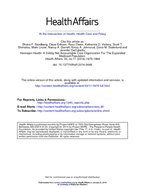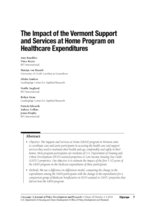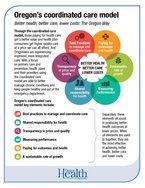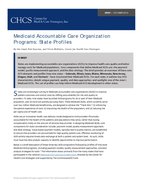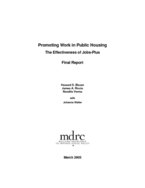Found 11 resources.
0
0
0
CLPHA’s Education Working Group hosts a webinar including presentations on efforts from the Chicago Housing Authority to work with residents on pursuing postsecondary opportunities, as well as an update from HUD’s Office of Policy Development & Research on data collection around tracking and increasing FAFSA utilization.
Topics: CLPHA, Cost effectiveness, Data sharing, Education, Funding, Housing, Housing Is Working Group, Low-income, Metrics, Midwest, Post-secondary, Research, Stability, Youth
0
0
0
Using multiple panels from the US Census Bureau’s Survey of Income and Program Participation, we find that participation in Temporary Assistance for Needy Families, the Supplemental Nutrition Assistance Program (SNAP), or public health insurance reduces the number of hardships low-income families with children experience by 48 percent and reduces the share who experience food insufficiency by 72 percent.
Topics: Child welfare, Cost effectiveness, Food insecurity, Legislation & Policy, Low-income, Medicaid / Medicare, Metrics, Research, Stability
0
0
0
Health care payment and delivery models that challenge providers to be accountable for outcomes have fueled interest in community-level partnerships that address the behavioral, social, and economic determinants of health.We describe how Hennepin Health—a county-based safety-net accountable care organization in Minnesota—has forged such a partnership to redesign the health care workforce and improve the coordination of the physical, behavioral, social, and economic dimensions of care for an expanded community of Medicaid beneficiaries.
Topics: Affordable Care Act, Cost effectiveness, Health, Low-income, Medicaid / Medicare, Mental health, Metrics, Partnerships, Research
 Shared by Housing Is
on Aug 9, 2018
Shared by Housing Is
on Aug 9, 2018 0
0
0
The Support and Services at Home (SASH) program in Vermont aims
to coordinate care and assist participants in accessing the health care and support services they need to maintain their health and age comfortably and safely in their homes. Most program participants are residents of U.S. Department of Housing and Urban Development (HUD)-assisted properties or Low-Income Housing Tax Credit
(LIHTC) properties. Our objective is to estimate the impact of the first 5 1/2 years of the SASH program on the Medicare expenditures of these participants.
Topics: Cost effectiveness, Dual-eligibles, East Coast, Health, Home visiting, Housing, Legislation & Policy, Low-income, Medicaid / Medicare, Metrics, Seniors
 Shared by Housing Is
on Aug 1, 2018
Shared by Housing Is
on Aug 1, 2018 0
0
0
SAHF members believe that connecting residents of affordable housing with needed supports – such as educational resources or health services – can help vulnerable families and seniors achieve
a better quality of life. SAHF began the Outcomes Initiative to create a common framework for its members to demonstrate with data the impact on residents of providing housing-based services and support in the five key areas listed below.
Topics: Asset building, Cost effectiveness, Dual-generation, Education, Exercise, Food insecurity, Health, Housing, Mental health, Metrics, Nutrition, Safety, Stability
 Shared by Housing Is
on Jul 26, 2018
Shared by Housing Is
on Jul 26, 2018 0
0
0
Through the coordinated care model, those paying for health care get a better value and health plan consumers get higher quality care at a price we can all afford. And Oregonians are experiencing improved, more integrated care. With a focus on primary care and prevention, health plans and their providers using the coordinated care model are able to better manage chronic conditions and keep people healthy and out of the emergency department.
Topics: Cost effectiveness, Data sharing, Health, Metrics, Partnerships
 Shared by Housing Is
on Jul 24, 2018
Shared by Housing Is
on Jul 24, 2018 0
0
0
States are implementing accountable care organizations (ACOs) to
improve health care quality and better manage costs for Medicaid populations. Core components that define Medicaid ACOs are: the payment model; quality measurement approach; and the data
strategy. This brief provides an overview of these core ACO elements and profiles how nine states -Colorado, Illinois, Iowa, Maine, Minnesota, New Jersey, Oregon, Utah, and Vermont -have structured their Medicaid ACOs. For each state, it outlines key ACO characteristics; details unique payment, quality, and data approaches; and spotlights ...
Topics: Cost effectiveness, Data sharing, Health, Low-income, Medicaid / Medicare, Metrics
 Shared by Housing Is
on Jul 23, 2018
Shared by Housing Is
on Jul 23, 2018 0
0
0
This final report on MDRC’s evaluation of Jobs-Plus describes the program’s impacts, that is, the difference it made for residents in Jobs-Plus developments in comparison with residents living in similar developments who did not receive the program. These findings offer important lessons to policymakers and program administrators about how to increase the economic self-sufficiency of public housing residents.
Topics: Asset building, Community development, Cost effectiveness, Legislation & Policy, Metrics, Research, Workforce development
 Shared by Housing Is
on Jul 17, 2018
Shared by Housing Is
on Jul 17, 2018 0
0
0
A Research Review and Comment on Future Directions for Integrating Housing and Health Services
Topics: Affordable Care Act, Cost effectiveness, Data sharing, Exercise, Health, Homelessness, Housing, Low-income, Medicaid / Medicare, Mental health, Metrics, Nutrition, Obesity, Partnerships, Preventative care, Research, Supportive housing
 Shared by Housing Is
on Jul 11, 2018
Shared by Housing Is
on Jul 11, 2018 0
0
0
Reducing Pediatric Asthma through Home Improvements and Education
Topics: Asthma, Child welfare, Community development, Cost effectiveness, Data sharing, Early childhood, Education, Family engagement, Health, Healthy homes, Housing, Low-income, Medicaid / Medicare, Metrics, Partnerships, Place-based, Preventative care, Research, Safety
 Shared by Housing Is
on Jul 10, 2018
Shared by Housing Is
on Jul 10, 2018 
